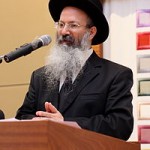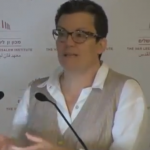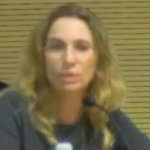Israeli marriage | עמוד דיון
Synopsis
Israeli marriage
Can the “Jewish” and “Democratic” coexist?


Democratic trumps Jewish
Civil marriage is the only way to safeguard basic human rights and these have to take precedence over other considerations .
Coercive religious marriage cannot be reconciled with human rights as it involves irreparable violations of the principles of equality and freedom of religion .


Summary
Democracy is obligated to safeguard the basic rights of its citizens, including the right to marry .Can the state promote values of the family even if in so doing it effects a limited infringement of rights.
Is the infringements of human rights resulting from the religious monopoly over marriage and divorce in Israel as Jewish state be proportionally balanced.
There are those who contend that maintaining Israel as a Jewish state is crucial. Others claim that human rights are being compromised more than necessary and propose various ways to balance the Jewish with the democratic character of the state. Three basic approaches to the solution of this challenge are discussed.
The Discussion
The historical reasons for instituting religious marriage as the only option
The source of the current system governing marriage and divorce in Israel is the Ottoman law (the “Millet system”), which was continued by the British Mandate and adopted by the State of Israel upon its establishment. According to this system, when it comes to matters of marriage and divorce, every resident of the State of Israel is governed by his/her respective religious laws and religious institutions.
In the early nineteen fifties, when Israel’s Rabbinical Court Jurisdiction (marriage and divorce) Law was passed (which applied personal status law to Jewish marriage and divorce), it was considered an appropriate compromise between different approaches within the Jewish public and a critical step in averting a rift within the Jewish people, as well as a means to prevent Jews from marrying people from other faiths. In addition, the practical difficulties that resulted from the passing of this law was limited: the number of people who could not marry under religious law was small and various ways to deal with the resulting practical and ideological difficulties were found.
In the past few decades, various proposals to change the status quo have been rejected. Primary justifications for rejecting these proposals include: concerns for an increase in cases of bastardy, the need to safeguard the Jewish character of the state as it was defined in the “status quo”, strengthening cohesion and unity between various Jewish groups and the need to prevent intermarriage.
For a more detailed discussion see position paper, p.19.

Present violations of human rights
The right to marry
The status of the right to marry as a fundamental right is derived from international conventions to which Israel is a signatory and rulings by Israel’s Supreme Court.
However, the fact that marriage and divorce are exclusively governed by religious law means that the citizens of Israel face many restrictions when they wish to realize their right to marry: restrictions relating to the identity of the potential spouse, denial of interfaith marriages, the fact that non orthodox rituals are not recognized, structural inequality which does not favor women in marriage and divorce, and more.
For the full discussion see: Ruth Gavison, position paper (on p.38), Aharon Barak.

Article 23 in the international Covenant on Civil and Political Rights mainly focuses on the protection of the rights of the couple to freedom and equality within a marriage. States which have signed the covenant can put in place different arrangements in the domain of family law, but these must conform to the constraints dictated by human rights. The state does not have the authority to infringe human rights or supersede them regardless of the type of regime in place or the religious and ethnic identity of the couple.
Israel has signed and ratified the covenant, but tendered its reservation regarding article 23 because the religious monopoly over marriage and divorce in Israel imposes restrictions on the freedom and equality of the couple who wish to marry (or divorce).
On the other hand – the first clause in this article is about the “family group unit’s” right to protection – this right places an obligation on society and the state. In light of society’s obligation to safeguard the institution of the family, a question arises whether it ought to also protect the family from the couple?
Another question that arises in this context is what is the status of the individual’s right to a family when weighed against the rights of distinct communities to preserve their culture (which may find unique expression particularly in the way families are defined and delineated)? It seems there is tension between the rights of individuals to build a family and the rights held by the civil society amongst which the family lives. There is also a tension between individuals’ right to a family and collective right of cultural communities – to which the couple belong – to preserve their unique character.
For an expanded discussion see: Ruth Gavison
The right to freedom of religion is founded in, among other things, Israel’s Declaration of Independence and the Universal Declaration of Human Rights. In matters of marriage and divorce this means that every human being has the right to choose between different religious rituals or choose to marry in a ceremony completely devoid of any religious aspect.
The law in Israel stands in conflict with this principle because it allows for marriage only within the framework of the religious law of the community to which the couple belongs, and does not allow for choice between different rituals or between alternative rituals within the same religion.
For an expanded discussion see:Daniel Statman , position paper (p.41)

The right to equality as a fundamental right is founded in the international conventions to which Israel is a signatory and in the rulings of Israel’s Supreme Court.
The exclusive jurisdiction given to religious law over matters of marriage and divorce in Israel infringes the principle of equality on several counts: significant gender gaps, infringements of the rights of the couple during marriage and particularly upon leaving the framework of marriage, lack of equality between the various religious texts – those recognized but the state and those which are not, non recognition of the right of people belonging to different religions or same-sex couples to marry.
For an expanded discussion: position paper (p.42), Ruth Gavison

Promoting the values of the collective while infringing the rights of the individual
Serious and widespread infringements of human rights in the service of important cultural goals cannot be justified.
In accordance with this, even if religion’s monopoly over marriage and divorce contributes to the Jewish character of the state, there is no justification for the pervasive violation of human rights that it causes, and it must be changed.
For an expanded discussion see: position paper, p.44

The State is permitted to favor certain forms of marriage, so long as it also upholds rights for other kinds of couples (common-law couples).
The article in full

-
x
An arrangement which prevents certain couples who wish to marry from doing so thereby forcing them to choose the institution of a “common-law partnership” is not legitimate, because marriage carries great significance (at least symbolic significance).
For an expanded discussion see position paper p.43.

-
x
I accept the arguments against what we have written in the abovementioned article. We have introduced corrections to the chapter on marriage and divorce in our book on religion and state in Israel.

The institution of marriage is not private but public and therefore reflects society’s perspectives on marriage and the family.

An extreme liberal view
There is no justification for even the slightest infringement of individual rights in the service of values promoted by the State.
For an expanded discussion

The family is an essential cultural component of Jewish identity. A Jewish state is obligated to uphold age-old traditions and therefore must only recognize a marriage that is sanctioned by Jewish Law (Halacha). There is no option to recognize marriage in any other way, but we can accept the idea of a couple’s partnership as a private legal entity.
For an expanded discussion

Unity among the Jewish people
An existential concern for the future and the unity of the Jewish people justifies infringements of individual rights to a certain extent.
For an expanded discussion see: Shlomo Avineri, Rabbi David Stav (from 0:51)

-
x
Actually, preserving the current system is creating a great rift among the Jewish People. The non-recognition of non Orthodox Jewish movements is alienating and distancing millions of Jews (in Israel and the diaspora) from Israel and the rabbinical establishment.
For an expanded discussion – p.22 position paper

For a discussion of the rift amongst the Jewish people

Ways to achieve a balance between “Jewish” and “Democratic”
The prominence of human rights is derived from both democratic and Jewish principles. Therefore, the pervasive infringements of these rights justifies changing the current system, from both a democratic and Jewish point-of-view.
For an expanded discussion see p.38 in the position paper

We must ensure that in matters relating to marriage and divorce human rights are protected. We can achieve this through interpreting the spirit of Jewish law (Halacha) in a way that embodies a democratic approach.
For this purpose I have developed a model called “acknowledge, distinguish and derive”. According to this model, one must acknowledge the fact that human rights are being violated, distinguish between civil law and Jewish law, and derive inspiration and guidance for resolving the conflict from Jewish tradition. This model has been put to use in two court rulings, which I mention.
To view

We must maintain a recognition of religious marriage as the only principal route to marriage in this state. In addition, we must offer a civil alternative for registering a couple, called “matrimonial partnership”, which would be available to couples who cannot or do not want to get married according to religious law.
Positions by: Shahar Lifshitz, Rabbi Yisrael Rosen, Rabbi Yuval Cherlow

-
x
Although I think there is a need to develop a uniform civil framework, perhaps, in order to avoid undermining the traditional notion of the marriage, this framework does not need to be defined as marriage.
To view

In fact, a broad civil framework could yield a wider and more varied expression of Jewish identity in that it recognizes different forms of Jewish expression in rituals even when these are not strictly Orthodox. These would include a variety of Jewish revival movements such as Reform, Conservative and even secular rituals which would draw on traditional elements in an atmosphere of freedom and an absence of coercion. This would facilitate greater identification with Jewish tradition.
For an expanded discussion see Shay Zarchi, as well as: Avishalom Wesreich, Pinhas Shifman, in a position paper by the Metzilah Center, p.40



One must favor the common good over the individual (even if, unfortunately, certain rights are infringed as a result).
Safeguarding the existence, cohesion and uniqueness of the people of Israel are important existential goals and therefore ought to be promoted (by upholding exclusivity for religious marriage), even if the rights of the individual would be violated as a result and certain groups would be prevented from marrying.
>For the article in full.
Rabbi Eli Ben Dahan
One must favor the common good over the individual (even if, unfortunately, certain rights are infringed as a result).
Safeguarding the existence, cohesion and uniqueness of the people of Israel are important existential goals and therefore ought to be promoted (by upholding exclusivity for religious marriage), even if the rights of the individual would be violated as a result and certain groups would be prevented from marrying.
For the article in full.